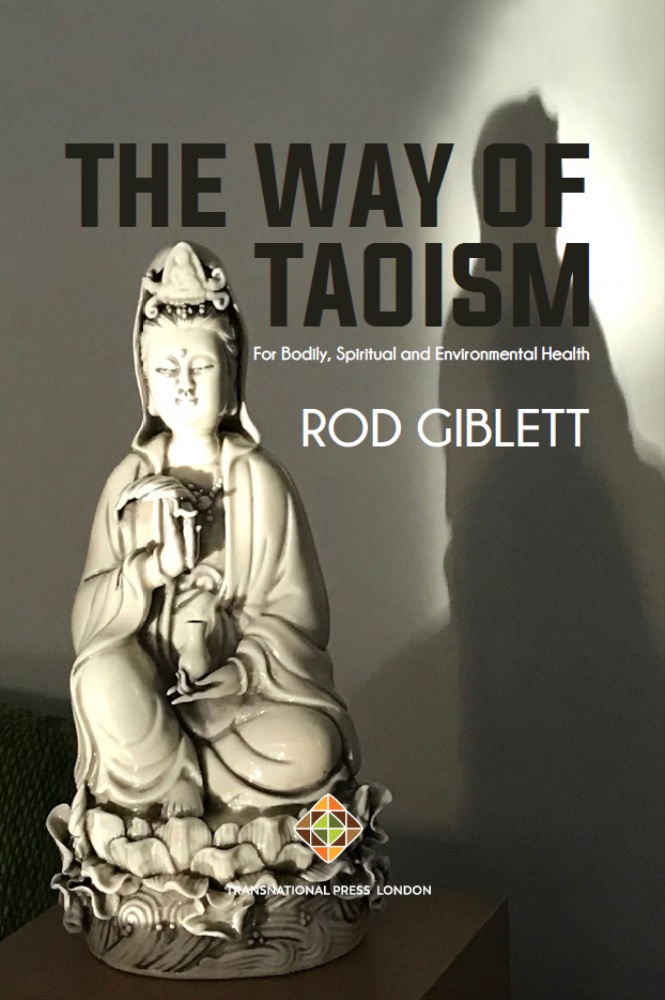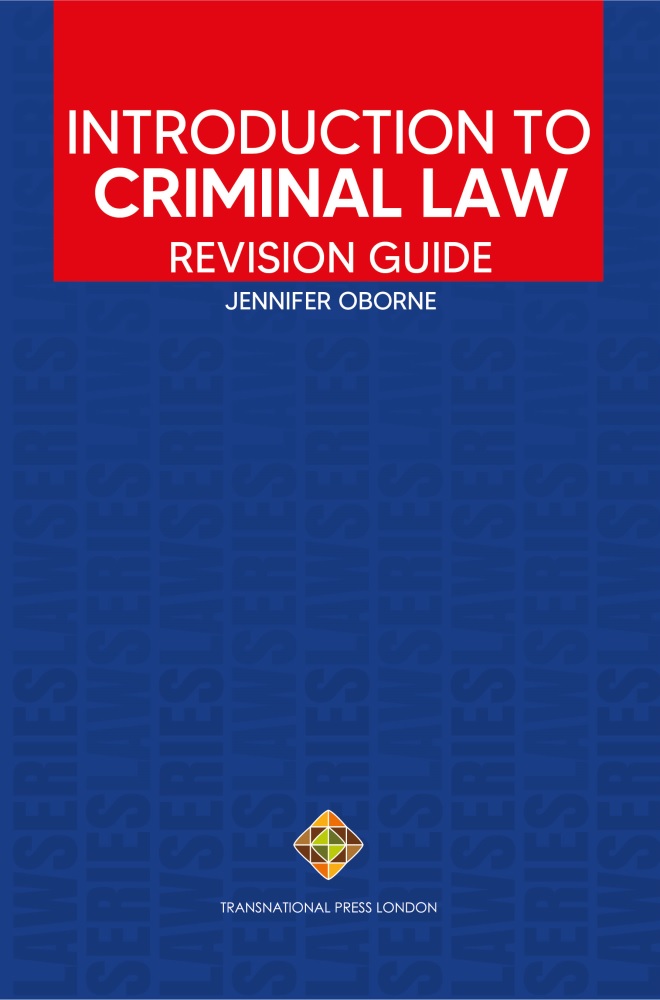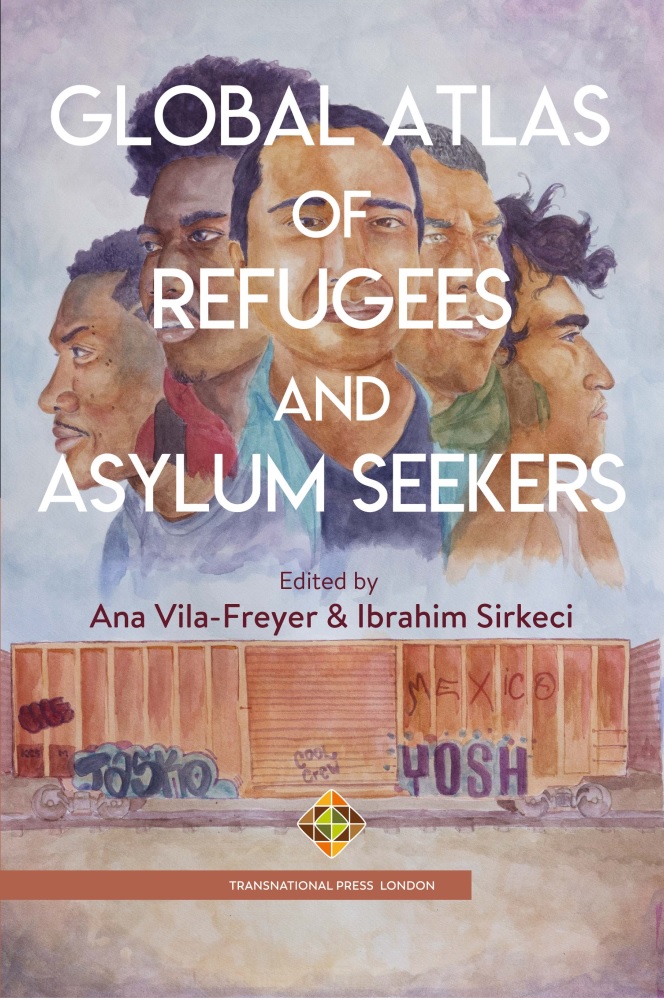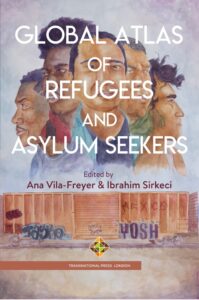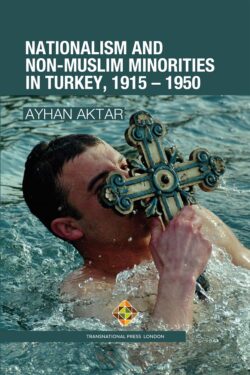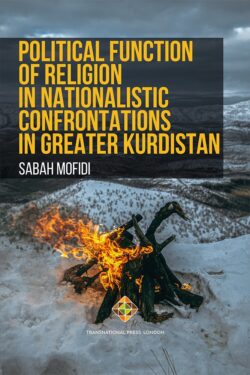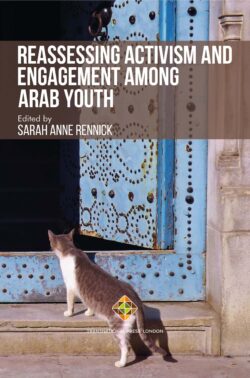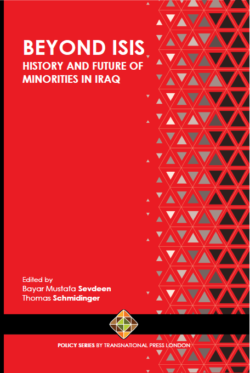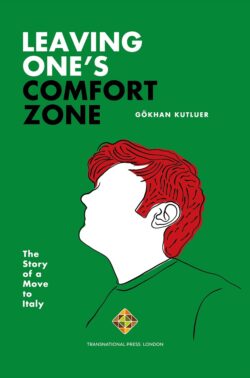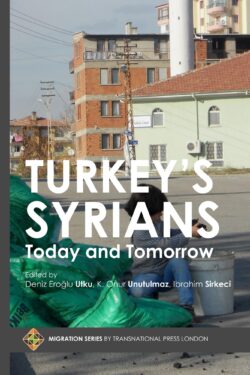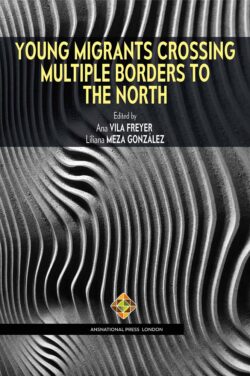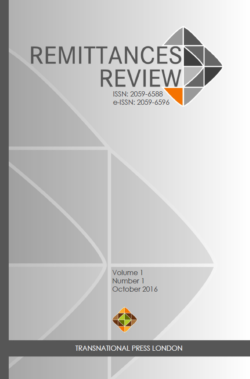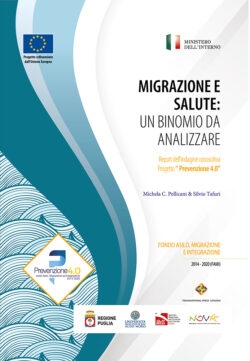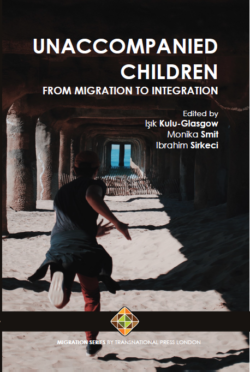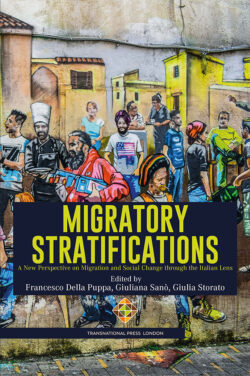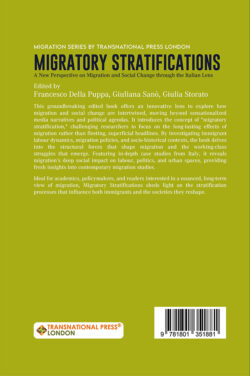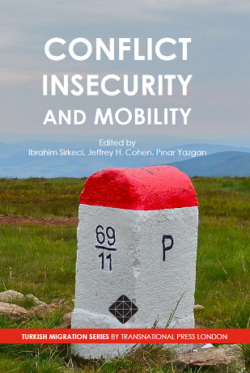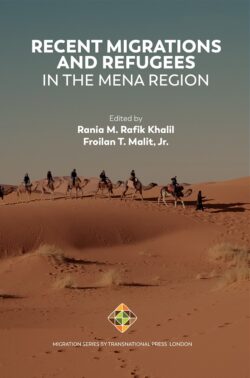Global Atlas of Refugees and Asylum Seekers
£39.50
Global Atlas of Refugees and Asylum Seekers Edited by Ana Vila-Freyer and Ibrahim Sirkeci | Published: 20 October 2023 [Migration Series: 45] Paperback: ISBN: 978-1-80135-233-8 – Buy at Amazon | Buy at Lulu | Buy at Talebe.com | Hardcover: ISBN: 978-1-80135-238-3 – Buy at Amazon | Digital: ISBN: 978-1-80135-234-5 – Read on Kindle | Read on GooglePlay | Read on CEEOL | Read on Talebe.com | Audiobook: Listen to on Google Play Books
Description
Global Atlas of Refugees and Asylum Seekers
Edited by Ana Vila-Freyer and Ibrahim Sirkeci
Published: 20 October 2023 [Migration Series: 45]
Paperback: ISBN: 978-1-80135-233-8 – Buy at Amazon | Buy at Lulu | Buy at Talebe.com
Hardcover: ISBN: 978-1-80135-238-3 – Buy at Amazon
Digital: ISBN: 978-1-80135-234-5 – Read on Kindle | Read on GooglePlay | Read on CEEOL | Read on Talebe.com
Audiobook: Listen to on Google Play Books
Dive into the intricate and globally significant topic of asylum and refugees with the “Global Atlas of Refugees and Asylum Seekers.” This compelling collection of essays, curated by a diverse group of renowned scholars, offers an extensive exploration of migration patterns, paradigms, and lessons from around the world. As you journey through the chapters, you’ll gain unique insights into how countries have responded to the unprecedented refugee crisis, examining notable cases such as Costa Rica, the United States, Canada, Chile, Mexico, and many more. Discover the complexities of asylum systems and the changing landscapes of migration policies in nations as diverse as Bulgaria, Italy, Germany, Greece, Sweden, Spain, and North Macedonia. Delve into the geopolitical implications of seeking refuge and asylum, with a comprehensive analysis of the Palestinian diaspora and an exploration of Pakistan, India, Turkey, and the communitarian-based strategy in refugee laws.
This essential compendium provides a comprehensive understanding of the intricate dynamics and global challenges surrounding asylum and refugees. With its diverse range of topics and expert contributors, the “Global Atlas of Refugees and Asylum Seekers” is a valuable resource for anyone interested in the complexities of global migration and the policies that shape the lives of those seeking refuge.
“The authors of this book identify two main paradigms shaping states’ narratives regarding asylum seekers and refugees. Along the horizontal axis, discourses range from national security to humanitarian aid. On the vertical axis, they extend from the pursuit of ideals, as traditionally defined for refugees and asylum seekers, to personal survival due to economic, climate-related crises, family violence, gender violence, or organized crime. This shift, as highlighted in the chapter on Germany by Professor Knerr, is altering the original vision of agreements that stemmed from post-World War II Europe.
Finally, the rise of populist and authoritarian states in Latin America, which cannot be solely explained by repressive authoritarianism but rather create conditions of difficult survival for their nationals, is exerting additional pressures. Additionally, religiously motivated civil wars, such as those in Afghanistan, Iran, and Syria, pose complex challenges. Should countries reconsider the principles on which they are acting?
Less obvious is the role of migration and refugee policies in influencing asylum seekers’ choice of their future destination. Many authors mention support networks and family ties as factors influencing refugees and asylum seekers’ decisions to leave their countries and select their destination. However, it remains unclear whether these networks operate in the same capacity as support networks for irregular migrants. Many chapters raise issues that have received little attention, primarily because of the focus on refugees and asylum seekers as agents. These issues include the reasons prompting the decision to leave one’s country of origin, who must leave, the influence of family or social support networks on this decision, their role in selecting possible settlement locations, and the role of civil society organizations in supporting and guiding these decisions. This is especially crucial considering that unaccompanied children represent 30-35% of asylum applicants. The chapters in this Global Atlas provide an overview of refugee and asylum regimes to enhance understanding and better plan for the ongoing and future challenges of human mobility.”
Contents
- Glocalizing Asylum, Refuge, and Migration? Patterns, Paradigms, and Lessons – Ana Vila-Freyer and Ibrahim Sirkeci
- Exemplary or Deficient? Costa Rica’s Refugee Response System and the Unprecedented Refugee Crisis – Daniel Alvarado and Koen Voorend
- Refugees Welcome? Historicizing U.S. Resettlement and Asylum Policy – Chiara Galli and Molly Fee
- Refugees and Resettlement in Canada: A complex history – Robert Vineberg and Lori Wilkinson
- Refugees and Asylum Seekers in Mexico – Ana Vila-Freyer
- Venezuelan Diaspora and Migration Policy in Chile: Processes of integration and exclusion (2017-2021) – Nicolás Gissi and Tomás Greene
- Dynamics and Expectations Among Refugees and Asylum Requests as an Emerging Social Phenomenon in Mexico – Rafael Alonso Hernández López and Rodolfo Cruz Piñeiro
- The Right to Apply for Asylum and Refuge: Changes in policy and regional dialogue in Guatemala – Aracely Martínez, Danilo Rivera and Lesbia Ortiz
- Refugee System in Colombia: the silent and prolonged throes of an outdated system – Carolina Moreno and Gracy Pelacani
- Refugees and Asylum Seeking in Morocco – Mohamed Khachani
- Refugee Policies and Practices in Bulgaria – Vanya Ivanova
- The Asylum System in Italy: A review of the changing flows, fragmented policy frameworks and the key role of civil society organisations – Carla De Tona, Gül Ince-Beqo, and Sahizer Samuk
- Policy and Trends in Italy – Eleanor Paynter and Francesca Soliman
- Refugees and Asylum in Germany in the 21st Century – Beatrice Knerr
- Unravelling the Complexities of the Migration and Refugee Question in Greece – Apostolos G. Papadopoulos, Loukia-Maria Fratsea and Pavlos Baltas
- The Critical 2015-2016 Turning Point of the Geopolitics of Refuge and Asylum in Sweden – Fanny Christou
- Asylum and Refugee Policy Trends in North Macedonia – Merita Zulfiu Alili, Shpresa Syla and Teuta Veseli-Kurtishi
- The Geopolitics of Refuge and Asylum in Spain – Mónica Ibáñez Angulo and Miguel Pajares
- Asylum and Refugees in Sweden – Bernd Parusel
- From The Middle East To Europe: Geopolitics of the Palestinians in exile – Fanny Christou
- Refugees and Asylum-Seekers Trends, Prospects, and Policies in Pakistan – Sadaf Mahmood, Muhammad Shabbir, Muhammad Idrees, Zhao Xi, Uzma Niaz, Rabia Mahmood
- Refugees in India: Social and Political Rights – Irudaya Rajan and Hemaadri Singh Rana
- Refugees and Asylum Seeking in Turkey – Mehmet Gökay Özerim, Burcu Kiper, Güldan Kalem
- Factors Affecting the Health Care Use of Syrian Refugee Women in Turkey – Aysun Hızıroğlu Aygün
About Authors
Ana Vila-Freyer (Editor) holds a PhD in political science from Université de Montréal and is a professor and researcher at Universidad Latina de México. Her research focuses on young migrants, Central American migrants who transit through Mexico, and transnationalism. She has been part of the Mexican National Research System (SNI) since 2018 and is a member of the scientific committee of The Migration Conferences. She has also served on the editorial board of Migration Letters. She has been awarded the Ford, MacArthur and Hewlett Foundations grant to support the education of future Latin American leaders. She has been a visiting researcher at the Ryerson Center for Immigration and Settlement at Ryerson University (Canada) and at the Universidad San Carlos de Guatemala. She has coedited Young Migrants Crossing Multiple Borders to the North (2021) and Young Migrants: Vulnerabilities, Boundaries, Protection and Integration (2020).
Ibrahim Sirkeci (Editor) is the Director of International Business School, UK. Professor Sirkeci has served in senior roles in many British universities, including the University of Salford and Regent’s University London. Ibrahim Sirkeci is an esteemed academic known for his influential work in migration studies. With a rich background in geography and social sciences, he has extensively researched conflict, insecurity and migration, transnationalism, and diaspora communities. His research mostly focused on Turkey, Germany, UK and Iraq. His insightful contributions, including numerous publications, reflect his interdisciplinary approach, making him a leading voice in the field. Beyond academia, Sirkeci engages in public discourse, advocating for evidence-based migration policies. His expertise and dedication have solidified his reputation as a prominent scholar. He has founded and edited several key journals in the field, such as Migration and Diversity, Migration Letters, Remittances Review, Goc Dergisi, and Border Crossing. Professor Sirkeci is the Chief Publications Editor of Transnational Press London and chairs the Migration Conferences since 2011. These venues he created serve as hubs for research, innovation, and engagement in fostering a greater understanding of global challenges around human mobility. For further details, see: https://sirkeci.uk
Daniel Alvarado is a Costa Rican researcher. He works at the University of Costa Rica, where he holds a research position at the Institute of Social Research (Instituto de Investigaciones Sociales) and teaches at the School of Political Science. He holds an MSc in Management and Public Policy from the Central American Institute of Public Administration (ICAP) and has a Licenciatura in Political Science and Sociology from the University of Costa Rica.
Mónica Ibáñez Angulo is Professor of Sociology at the University of Burgos, Spain. Professor Mónica Ibáñez Angulo holds a PhD in Anthropology from the University of Chicago. She has authored several articles and books. Her research revolves around, citizenship, migration processes, and transnational space.
Pavlos Baltas is a researcher at the Institute of Social Research (IKE) in the National Centre for Social Research (EKKE), Greece. He holds a PhD in Demography, an MSc in “Population, Development and Prospects”, an MSc in “Spatial Planning and Regional Policy”, and a Diploma in Planning, Urban and Regional Development. He has participated in several research projects on demographic analysis, population forecasting, social data analysis, thematic mapping, and migration. His research interests include demographic analysis, population geography, social data mining, and analysis from unconventional data sources such as satellite imagery and social media.
Muhammad Shabbir Chaudhry, PhD, working as Director BZU Sub-Campus LODHRAN & Associate Professor at the Department of Sociology, BZ University Multan, since April 2023. Before joining BZU, Dr Shabbir was an Associate Professor at the Department of Sociology, at GC University Faisalabad. He has completed his Doctorate of Philosophy (Ph.D.) in Sociology (2015), from the Department of Sociology, University of Peshawar, Peshawar KPK, Pakistan. His areas of Specialization are Sociology of Development, Sociology of Migration, Community Development, and Sociology of Gender. Being a researcher, he produced 07 PhDs and supervised more than 45 MPhil. students. He has more than 75 research publications on his credit and he has presented (05) research articles in national and international conferences. He is a member of different national and international professional organizations and societies. Before joining the GC University, Dr Shabbir served different national and international organizations as an employee and as a freelance consultant Oxfam GB-2014, USAID, PWO-2012, SFARI-Pak, Save the Children, Indus Consortium, Dooba Foundation, The Asia Foundation, World Vision International, UNICEF, RSPN, UNDP, Sustainable Development Foundation, LPP Lodhran and ASB Faisalabad and Others with a special focus on underprivileged communities including children and women in Pakistan. He has completed long-term and short-term social and community development projects with the above organizations and served different organizations as a resource person and trainer.
Fanny Christou Fanny Christou holds a 5-year Political Science Diploma from Sciences Po and has earned two Master’s degrees in International Relations. She completed her PhD in Geography in December 2017, focusing on the Palestinian diaspora in Sweden, a research endeavour jointly conducted at the University of Poitiers and the American University of Beirut. During her doctoral studies, she was honoured with a fellowship from the Centre for Middle Eastern Studies at Lund University. Following her doctoral studies, Fanny secured a post-doctoral grant from the French Red Cross Foundation, enabling her to delve into research on the Palestinian diaspora in Germany. Presently, she is actively engaged at Malmö University, where she is part of a project funded by the Swedish Research Council, specifically exploring migration dynamics in Sudan. Additionally, Fanny is deeply committed to her role in teaching Middle East-related subjects at various academic institutions.
Carla De Tona is a Senior Researcher and Assistant Professor at the Department of Political and Social Sciences at the University of Bologna, Italy. Her expertise lies in international migration, gender, memory and narratives, sociology of education, and qualitative research methodologies. She has a PhD in Sociology from Trinity College Dublin, Ireland, and has worked as a Research Associate/Fellow at Trinity College Dublin, the University of Manchester, and the University of Bologna. She has worked as an advisor for several European research projects and on the Editorial Review Board of Migration Letters journal.
Molly Fee is a Postdoctoral Prize Research Fellow in Sociology at Nuffield College, University of Oxford. She studies how organizational structure and policies shape the migration and incorporation of refugees and how refugees interact with the institutions that grant rights and resources. Through extensive community-based ethnography and policy analysis, Molly examines the lived experience of refugees at multiple stages along the forced migration trajectory. Molly received her PhD in Sociology from the University of California, Los Angeles.
Loukia-Maria Fratsea is an experienced researcher at the Department of Geography, Harokopio University, Greece. She holds an Integrated Master in Agricultural Economics, an MSc in Rural Development, both from the Agricultural University of Athens and a PhD in Social Geography, jointly supervised by Harokopio University and the University of Calabria (Italy). She specialises in the social and geographical analysis of mobilities in rural and urban areas. She has worked as a researcher and project manager in numerous research projects funded by Greek authorities, the European Commission, and international organisations. She is a member of the Executive Committee of the European Sociological Association (ESA). Her research interests include migration and social change and social stratification and mobility.
Chiara Galli is Assistant Professor of Comparative Human Development at the University of Chicago. She is the author of Precarious Protections: Unaccompanied Minors Seeking Asylum in the US (University of California Press, 2023).
Nicolás Gissi Barbieri is a researcher in the Department of Anthropology at the University of Chile and holds PhD in Anthropology (UNAM, Mexico). Nicolás is also a postdoctoral researcher in Migration Studies at the Institute of Migrations, University of Granada, Spain. Nicolás is responsible researcher in ANID-CONICYT Project on “Emerging citizenships and migrant social organization from the south-central Chile: Imaginaries and demands in the new institutional framework” and Fondecyt Regular Project No. 1220993 (2022-2026). He was the responsible researcher of the Project “U-Nomads. Network of Socio-Anthropological Research on Migrations, Intercultural Relations and Public Policies”, VID, University of Chile (2017-2021).
Tomás Greene Pinochet is Attorney and holds a Master in Law (LLM) with mention in Constitutional Law by the Pontifical Catholic University of Chile. He is also a partner of the law firm Aguirre & Greene. Tomás served as head of the legal department of the Jesuit Migrant Service and as a lecturer at the Immigration Law legal clinics at Pontifical Catholic University of Chile and Alberto Hurtado University. He can be reached at tomas.greene@aguirreygreene.cl.
Aysun Hızıroğlu Aygün, PhD, is an assistant professor in the Department of Economics at Istanbul Technical University (İTÜ). Her research focuses on evaluating health and education policies through empirical microeconomic studies. Her work was published in economics and health policy journals, including the Journal of Health Economics and the International Journal of Health Planning and Management. She is visiting the Business Center for Advancement in Health (BACH) at the University of Minnesota as a Marie Skłodowska-Curie Fellow in the 2023-2024 academic year. She holds a PhD in Applied Economics from Northeastern University and a BA in Economics from Boğaziçi University.
Muhammad Idrees, PhD, is currently working as an Assistant Professor of Sociology at the University of Agriculture Faisalabad. Dr. Muhammad Idrees’ research interests are human capital, migration, demographic dividend, and economic development in the country. His research work has been published in several well-renowned national and international journals and presented some valuable pieces of his research at national and international conferences and participated in several symposiums and workshops.
Gül Ince-Beqo, PhD, holds a co-tutelle PhD from the Catholic University of Milan and the Regent’s University of London. Her research interests include, but are not limited to, family migration, gender and migration policies. She conducted a one-year policy research at the CNEL (Italian National Council of Economics and Labour). After a one-year research grant at the University of Bari and at the University of Urbino, she is currently a postdoctoral research fellow at the University of Milan within the HORIZON EU-funded “FAiR” project that explores ways to increase EU return migration governance.
Vanya Ivanova, PhD, is Assistant Professor at the Balkan Ethnology Department at the Institute of Ethnology and Folklore Studies with Ethnographic Museum, Bulgarian Academy of Sciences since February 2020. Her research interests are in the sphere of international migrations, mobilities, highly qualified migration, return migration, forced migration, refugee adaptation and integration, dealing with the recent past, and others.
Güldan Kalem is a PhD candidate in European Studies focusing on the European gender equality policy. She has a bachelor’s and Master’s degree in Educational Management. She has been working as an EU project expert for more than 15 years. Previously she worked as Education Attaché for 3 years in the US. She was a visiting researcher with a Jean Monnet Scholarship at University of Surrey, UK in 2010. Currently, she is working at Yasar University European Union Research Center as an EU Expert. She has been involved in many EU-funded projects and provided training on “project cycle management”. Her academic interest areas are the EU gender equality policy, higher education policy, intercultural aspect of the EU, EU education and youth policies, and EU research and development policy.
Burcu Kiper is a PhD candidate in the European Studies program at Dokuz Eylul University (Turkey). Her research interests include inclusive entrepreneurship, youth, diversity, and gender. She has ten years of experience working at the Council of Europe and Yasar University EU Research Centre, where she supported research management and international projects. Currently, she is focusing on accelerating the impact of European projects at the Crowdhelix network.
Mohamed Khachani is a distinguished academic and a prominent expert in the fields of economics and migration studies. With a Doctorat d’Etat in Economics from the University Lumière Lyon II, France, and a Doctorat de 3ème cycle from the University of Social Sciences in Grenoble, his academic journey has been marked by excellence. Currently holding the position of a Professor of Higher Education at the University Mohammed V in Rabat, Morocco, he has demonstrated a strong commitment to advancing research and understanding in the realm of migration. As the President of the Association Marocaine d’Etudes et de Recherches sur les Migrations (AMERM), he actively contributes to migration-related research. Moreover, he’s also a member of the Association Internationale des Démographes de Langue Française and a council member of AMERM. He is a distinguished authority in both Morocco and abroad.
Beatrice Knerr is affiliated as Prof. em. to the University of Kassel, Germany, where, until 2015, she headed the Dept. of Development Economics, Migration and Agricultural Policy. Since 2015, she has worked as visiting Professor at different Universities in Indonesia, University of Hue (Vietnam), and Universidad Autonoma de Yucatán (UADY) (Mexico); and from 2019 to 21 as Professor of Economics at University of Hefei (PR China). Presently (2023) she teaches on issues of economic development at University of Göttingen, Germany. She has edited and co-edited around 40 books and published about 70 research papers on international migration.
Rafael Alonso Hernández López is Professor and Researcher in the Department of Social Studies and Coordinator of the Doctorate in Migration Studies at El Colegio de la Frontera Norte in Tijuana, Mexico. He has a Doctor in Social Sciences from the Center for Research and Higher Studies in Social Anthropology (CIESAS-Occidente). He obtained the Award for the best Doctoral thesis from the Arturo Warman Interinstitutional Chair 2016. He is a Member of the National System of Researchers at level 1. He has a career of more than 10 years in activism defending the human rights of migrants and refugees in Mexico. He is currently a member of the Board of Directors of Hospitalidad y Solidaridad A.C. organization that houses and accompanies refugees in Chiapas, Mexico. He was President of the Citizen Council of the National Migration Institute and Director of FM4 Paso Libre in Guadalajara, Mexico (shelter for migrants in transit). He was also National Coordinator of the Documentation Network of Migrant Defense Organizations, a space that links 23 shelters for migrants and refugees throughout Mexico. His topics of interest are International migration, Migration flows, migration in transit through Mexico, applicants for recognition of refugee status, refugees and human rights, and migration policy.
Rabia Mahmood is currently pursuing her PhD in Sociology at the esteemed School of Sociology, Huazhong University of Science and Technology, located in Wuhan, China. Her research endeavors are centered on the dynamic intersection of socioeconomic status and the integration level of international immigrants within the Chinese context. This study delves into understanding the nuanced correlations and implications for immigrant populations in China. In addition to her doctoral research, she actively participates in various research studies addressing critical societal issues. Her involvement spans a diverse range of topics, including migration, women empowerment, cerebral palsy children development, domestic violence, and the challenges faced by the transgender community. The amalgamation of these research pursuits amplifies her commitment to contributing meaningfully to society.
Sadaf Mahmood, PhD, is currently working as an Associate Professor of Sociology and additionally, providing her services as Director of Career Counselling and Alumni Affairs, at the Women University Multan. In 2016, Dr Sadaf Mahmood earned her PhD from Germany and she has 13 years of working experience in academia and research. She worked as an Assistant Professor in the Department of Sociology, at Government College University Faisalabad, and being an HEC-approved supervisor; she supervised above 30 MPhil and 3 PhD research students. Her research work has been published in several well-renowned national and international journals. She also wrote book chapters for several international. She has presented some valuable pieces of her research at national and international conferences and participated in several symposiums and workshops as a resource person and completed an HEC research project as well while a team member of several international projects. Her research interest includes international migration and development, gender perspectives, human capital, and labor force participation.
Aracely Martínez is a Guatemalan Anthropologist, holds a PhD on contemporary migrations and has done research on migrations, gender, religions and development for national and international projects. She is a member of civil society and academic platforms. Director of the Development Department at Universidad del Valle de Guatemala, where she coordinates academic initiatives on monitoring and evaluation, public policy, local economic development and research methodologies. She has coordinated several academic projects on financial education, intercultural dialogue, governance, and intersectionality. Currently, she is the director of the Project Building understanding of the physical, cultural and socio-economic drivers of risk for strengthening resilience in the Guatemalan Cordillera, with the University of Edinburgh.
Carolina Moreno is an associate professor at the Law Faculty of Los Andes University, Faculty Director of Research, and the director of the Center for Migration Studies at the same Law School. She co-founded the Legal Clinic for Migrants at Los Andes University.
Uzma Niaz, PhD, is currently working as an Assistant Professor of Sociology at the Women University Multan. Dr. Uzma Niaz’s research interests are neglected children, excluded populations from the mainstream, marginalized groups of society, and gender studies. Her research work has been published in several well-renowned national and international journals and presented some valuable pieces of her research at national and international conferences and participated in several symposiums and workshops.
Lesbia Ortiz is a researcher at the Institute of Historical, Anthropological and Archaeological Research of the School of History, San Carlos University of Guatemala, since 1988. She coordinated the Institute between 2003 and 2007. She was President of the Central American Network of Anthropology from 2010 to 2013. Currently she’s a member of the Articulator Group of the Civil Society in Migratory Matter in Guatemala and the Vice President of the Coordination Board of the National Roundtable for Migration in Guatemala. In her most recent research titled “Border, human mobility and security. A theoretical approach to the migration studies”, she analyzes the way these concepts have been applied and how they have changed during the last 20 years.
Mehmet Gökay Özerim is the Chair of the Department of International Relations at Yaşar University and the Director of the EU Jean Monnet Centre of Excellence (EU Research Center). In 2019, he was awarded a Jean Monnet Chair on “Migration in Turkey-European Relations” by the European Commission, and in 2022, he was awarded as the coordinator of the Jean Monnet Centre of Excellence on Diversity Studies. Prof. Dr. Özerim is a member of the Youth Researchers team (PEYR) at the Council of Europe. Since 2004, he has been involved in several national and international projects, and he has published extensively on topics related to international migration, youth, security, and European integration, both nationally and internationally.
Apostolos G. Papadopoulos has studied sociology in Greece and in the UK and holds a DPhil in Geography (University of Sussex). He is the Director of the Institute of Social Research (EKKE) and a Professor in the Department of Geography at Harokopio University. He has coordinated as a project leader and worked as a senior researcher in several research projects financed by the European Commission, the Greek State, and other international and national organizations. His research interests include the following: social class and social mobility; rural transformations; rural development and policy; labour market and economic restructuring; migrant labour and integration; migration policy; mobilities and spatial justice; and social impact of social research.
Miguel Pajares is a graduate of Biological Sciences and holds a PhD in Social Anthropology from the University of Barcelona. He is a research member of the Gender, Identity and Diversity Research Group, attached to the Department of Social Anthropology of the Faculty of Geography and History of the University of Barcelona. He is the honorary president of the Catalan Asylum Action Commission and member of Ecologistas en Acción. He authored several books and numerous articles, focused on topics such as immigration, asylum, human rights and the fight against racism. Dr Pajares is also the author of five novels of social criticism, published between 2013 and 2022. In recent years, he has focused on the study of climate migrations). More information in www.miguelpajares.com
Bernd Parusel is a Senior Researcher in Political Science at the Swedish Institute for European Policy Studies (SIEPS). His main research interests are in policies on migration, integration, asylum and borders in the EU and in the Member States of the EU. Bernd holds a PhD from the University of Osnabrück, Germany. He studied at the Freie Universität Berlin and during exchange studies in Naples, Italy. Before joining SIEPS, Bernd worked as an expert at the Swedish Migration Agency where he was responsible for activities within the European Migration Network (EMN). He also worked as a research coordinator at the Swedish Migration Studies Delegation (Delmi) and as an adviser to a government-appointed commission on the future of Swedish migration policy.
Eleanor Paynter studies displacement, asylum, and migrant testimony, focusing on Mediterranean migration and migrant rights in the Italian context. Drawing on narrative and ethnographic methods, her research examines how border crossers navigate changing border and asylum regimes and represent their experiences in a range of media, as well as how public and political discourses about migration and asylum reflect broader cultural and political questions in Italy and Europe. She holds a PhD in Comparative Studies from the Ohio State University, was recently Postdoctoral Associate in Migrations at Cornell University, and is currently Postdoctoral Research Associate in Italian Studies and with the Cogut Institute for the Humanities at Brown University.
Gracy Pelacani is an assistant professor at the Law Faculty of Los Andes University, a member of the Center for Migration Studies at the same Law School, and director of the research hub on Law and Migration in Colombia. She co-founded the Legal Clinic for Migrants at Los Andes University.
Rodolfo Cruz Piñeiro Doctor in Sociology with a specialty in Population from the University of Texas at Austin; Master’s Degree in Demography from El Colegio de México; member of the National System of Researchers, Level III. At El Colegio de la Frontera Norte he has been: Academic General Secretary; Director of Postgraduate Studies, General Director of Liaison and Director of the Migración Internacional Journal; Member of the Board of Trustees of the organization Sin Fronteras, A.C. He was president of the Mexican Society of Demography (SOMEDE) 2002-2004; Advisor member of the International Community Foundation (FIC); Member of several Editorial Boards. He has also been a visiting professor at the University of Texas at Austin and San Diego State University.
Irudaya Rajan is Chair of the International Institute of Migration and Development, India and also chair of the World Bank KNOMAD working group on internal migration and urbanization. He is the editor of two Rouledge Series – India Migration Report (since 2010) and South Asia Migration Report (since 2017) and Founding Editor in Chief, Migration and Development (Sage). Rajan has published extensively in national and international journals on demographic, social, economic, political and psychological implications of international migration and coordinated nine large-scale migration surveys in Kerala since 1998 (with K C Zachariah), Goa (2008), Punjab (2009), Tamil Nadu (2015) and instrumental for Gujarat (2011), Jharkhand (2023) and Odisha (2023).
Hemaadri Singh Rana holds the position of Assistant Professor at Amity University, Noida, Uttar Pradesh, India. She had a former designation as a Fulbright-Nehru Doctoral Research Fellow (2020-2021) at Northwestern University, Evanston, Illinois, U.S.A. She had also held Assistant Professor position for a year at Graphic Era (Deemed to be) University, Dehradun, Uttarakhand, India. Throughout this research odyssey, she has etched her scholarly presence onto the pages of various journals and contributed four chapters to distinguished book publications, including eminent imprints like Routledge and Sage Publications. Her articles had also been published in Mainstream Weekly, Third Concept and Café Dissensus magazine. The spectrum of her research interests spans topics such as forced migration, refugee crises, integration, community conflict, peace and conflict resolution, and Western political philosophy.
Alfredo Danilo Rivera has been working as an analyst, researcher, and consultant on migration, asylum, and refugee issues in Guatemala and Central America since 2005. He is an advocate for the management and impact of these concerns and has played a key role in promoting dialogue processes and the development of public laws and policies in Guatemala. He is a member of the Central American Institute of Social Studies and Development (INCEDES) and the Articulating Group of the Society on Migration Matters for Guatemala. Mr. Rivera holds a degree in Public Accounting and Auditing from Rafael Landivar University in Guatemala and has pursued studies in Migration and Governance at the Center for Economic Research and Teaching (CIDE) in Mexico, as well as Migrant Children and Adolescents by OIM Costa Rica, and Central American Integration by INCEP-USAC PROIRCA-SICA, Guatemala.
Sahizer Samuk is an independent researcher based in Lucca, Italy. She received her PhD in Political Science at the IMT School for Advanced Studies Lucca in May 2016. Briefly, she worked for IOM Ankara on supporting the development of harmonisation policies in Turkey. She used to work as a short-term post-doc at the University of Luxembourg for a Horizon 2020 project, MOVE. In Italy, she worked at the University of Pisa, UBIQUAL, on brain drain from Italy. She also worked at the LYNX Research Center at IMT Lucca. She has publications on refugees, integration policies in Canada, Italy, Turkey and the UK, local cultural policies and the temporalisation of migration.
Muhammad Shabbir, PhD, Assistant Professor, Department of Sociology, Government College University Faisalabad, Pakistan.
Francesca Soliman is is a lecturer in criminology at Edinburgh Napier University in Scotland (UK). Francesca’s research examines the social harms linked to processes of borderisation, with a particular focus on the impact of border performance on remote island communities at the external margins of the European Union. Francesca’s work seeks to further develop the emerging discipline of zemiology as a tool to analyse the harmful impacts of border policies, but also to advance critical approaches towards states’ roles in constructing and addressing social problems more in general.
Shpresa Suli is an Associate Professor of Economy and Applied Statistics at the Faculty of Economy and Business, South East European University, Tetovo, North Macedonia. Shpresa completed her MSc at the University of Prishtina, Kosova and PhD studies at South East European University, Tetovo. She also works as a visiting professor at many Universities in the region. Shpresa’s scientific interests are foreign direct investment, gender equality, transition economies, and GDP. She was engaged as a researcher in economy and statistics: Shpresa Suli| South East European University (seeu.edu.mk).
Teuta Veseli-Kurtishi is an Associate Professor at the Faculty of Business and Economics, South East European University. She received a PhD in Marketing at the Faculty of Economics at the University of Tirana. Her main research interests are applying marketing strategies and their impact on business and education institutions. Teuta Veseli-Kurtishi published several scientific papers in international and national journals and participated in many scientific international conferences: Teuta Veseli-Kurtishi | South East European University (seeu.edu.mk).
Robert Vineberg’s career in the Canadian Federal Public Service spanned over 35 years, of which 28 were with the immigration program, serving abroad, in policy positions at national headquarters and, most recently, as Director General of Citizenship and Immigration Canada’s Prairies and Northern Territories Region. Mr. Vineberg has written and published several peer-reviewed articles on immigration and military history. His book, Responding to Immigrants’ Settlement Needs: The Canadian Experience (Springer), was published in 2012. He is currently Chair of the Board of Trustees of the Canadian Museum of Immigration at Pier 21 in Halifax. He is also Chair of the Board of Governors of Immigration Research West and a Senior Fellow with the Canada West Foundation.
Koen Voorend is a Dutch researcher based in Costa Rica. He is a full professor at the University of Costa Rica, where he holds a research position at the Institute of Social Research (Instituto de Investigaciones Sociales), where he is currently director, and teaches at the School for Communication. He holds an MSc and a PhD in Development Studies from the International Institute of Social Studies, The Hague, and another MSc in International Economics Studies from the Maastricht University, The Netherlands.
Lori Wilkinson is a professor in the Department of Sociology and Criminology at the University of Manitoba. She holds a Canada Research Chair in Migration Futures. Her research centres on the economic and social outcomes of immigrants and refugees. She is also the director of Immigration Research West, a multidisciplinary group of over 100 members who work together to educate Canadians about the contributions of newcomers. She volunteers with several international, national and local community organizations who are working toward the successful resettlement of newcomers.
Zhao Xi, PhD, received a dual bachelor’s degree from Peking University, a master’s degree from Technische Universität Dresden, and a PhD and Postdoctoral degree from Kassel University, Germany. Dr. Xi Zhao is the Director of the Sino-German Economic Development and Innovation Research Center (SGEDI) and an Associate Professor at the School of Economics and Management, Hefei University, China. Her research interests include innovation, entrepreneurship, and gender study.
Merita Zulfiu Alili is an Associate Professor of Labour Economics at the Faculty of Contemporary Social Sciences, South East European University, Tetovo, North Macedonia. She is a member of the University Senate and a member of the Women in Science Network. Merita completed her MSc and PhD studies in Economics at Staffordshire University, United Kingdom. In 2015, 2018, 2021 and 2022, she joined CERGE-EI Career Integration Fellows, Prague. Merita’s scientific interests are labour migration, foreign direct investment, labour market inequality, gender equality, and transition economies. She was engaged as a researcher and expert in several projects in the field of migration and has published several articles related to labour migration: Merita Zulfiu | South East European University (seeu.edu.mk).
CREDITS:
Cover Design: Nihal Yazgan
Cover Image by Jorge Orlando Mocttezuma Hernández
Product Details:
Migration Series: 45
ISBN: 978-1-80135-233-8 (Print)
ISBN: 978-1-80135-238-3 (Hardcover)
ISBN: 978-1-80135-234-5 (Digital)
Publisher: Transnational Press London
Published: 20 October 2023
Language: English
Pages: 349
Binding: Paperback
Interior Ink: Black & white
Weight (approx.): 0.95 kg
Dimensions (approx.): 15 cm wide x 23 cm tall
Additional information
| Weight | 0.35 kg |
|---|---|
| Version | |
| Binding | Paperback |
| Interior Ink | Black and White |

